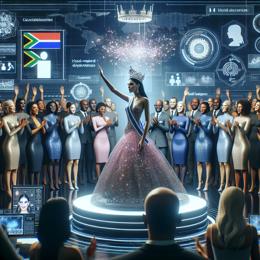Created by Bailey our AI-Agent
Gen Z Leading a Surge in LGBTQ Identification, Research Reveals
In a groundbreaking revelation, a new survey conducted by the Public Religion Research Institute (PRRI) unveils that nearly 30% of Gen Z adults in the United States identify as LGBTQ, highlighting a significant cultural shift in identity and self-expression among the younger population. The PRRI's findings have profound implications on the societal, political, and religious landscapes of the nation.
The institute's recent survey, which accrued responses from over 6,600 participants, was methodically executed during August and September. In detailing the generational breakdown, it was discovered that 28% of Gen Z adults, aged 18 to 25, identify as part of the LGBTQ community. This figure vastly outnumbers those of prior generations, where only 10% of all adults, 16% of millennials, 7% of Generation X, and roughly 4% of both baby boomers and the Silent Generation, have identified as LGBTQ.
Melissa Deckman, the chief executive at PRRI, underscored the stark contrasts in LGBTQ identity between Gen Z adults and their older American counterparts. The report delves further into the identity specifics, revealing that within the Gen Z group, 72% identify as straight, 15% as bisexual, 5% as gay or lesbian, and an additional 8% as other LGBTQ identities.
Parallel to their LGBTQ identity, Gen Z adults depict a broader ethnic and racial diversity than seen in elder generational groups, which is compounded by their diminished affiliation with established religions. Notably, the survey found that Gen Z adults, along with millennials, were more inclined to identify as LGBTQ than Republican.
These findings corroborate with similar studies, notably Gallup's most recent poll, which reported that 7.2% of all U.S. adults, and almost 20% of Gen Z—defined in their survey as individuals between the ages of 19 to 26—identify as LGBTQ. These statistics solidify Gen Z's position as the most queer-identifying adult generation in recorded history.
But the report's unveiling comes at a contentious time for LGBTQ rights within the country. There has been an unprecedented number of anti-LGBTQ bills proposed in state legislatures, surpassing 500 in the last year alone, as per monitoring by the American Civil Liberties Union (ACLU). Out of these, 75 were enacted into law. The ACLU foresees that over 320 bills have been pre-filed or introduced during the current state legislative sessions, marking an escalation in such measures.
The surging visibility and activism of LGBTQ individuals, particularly among the youth and Gen Z, are transforming the socio-political discourse around LGBTQ rights. Kelley Robinson, president of the Human Rights Campaign—the largest LGBTQ advocacy group in the U.S.—stresses the pivotal impact this rising demographic will have on lawmakers, especially with a burgeoning number of LGBTQ youth reaching voting age daily. The November electoral outcomes could reflect the Gen Z's advocacy against anti-LGBTQ legislative attacks.
The ascension of Gen Z's LGBTQ identification reflects a transformative paradigm in cultural identity, pointing towards a future that embraces diversity and inclusivity. Lawmakers and institutions across the United States now face the formidable task of reconciling this emerging socio-cultural reality with the legislative domain, a fusion that will shape American society for generations to come.










